Masterclass on Leadership: Forks in the Road with Dr Clyde W Yancy
Published: 23 June 2023
-
Views:
 1194
1194
-
Likes:
 7
7
-
Views:
 1194
1194
-
Likes:
 7
7
-
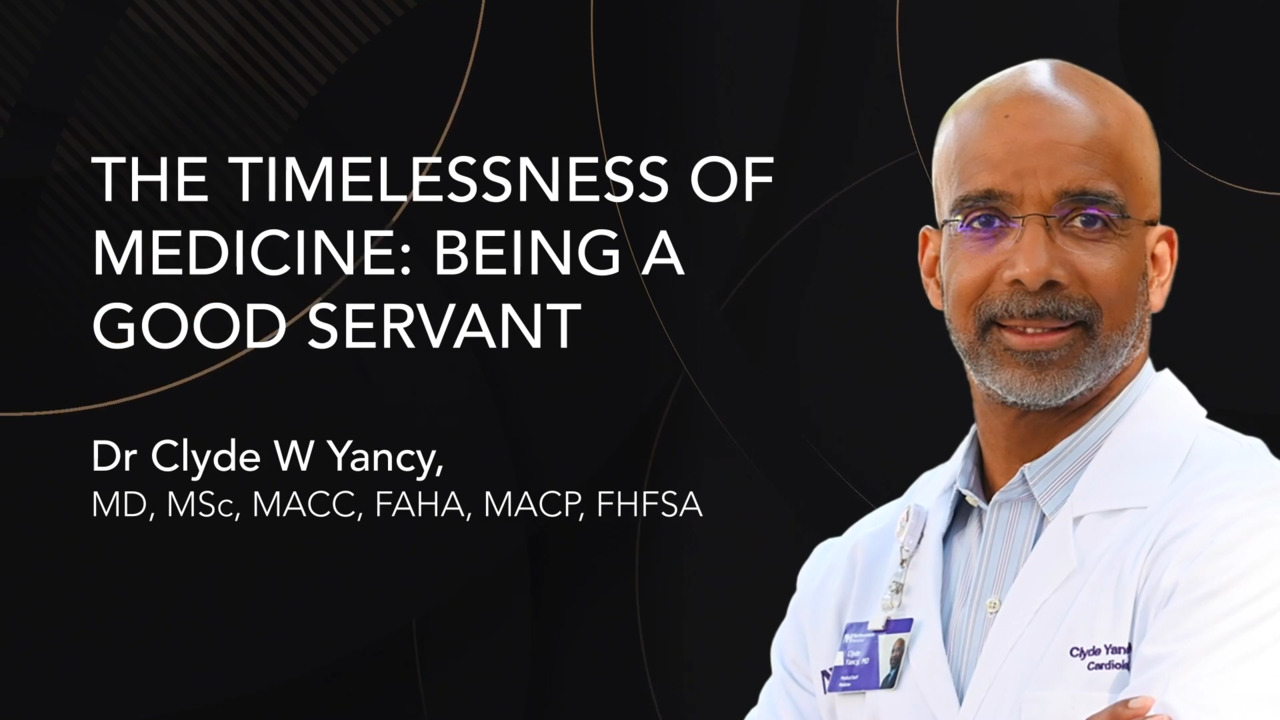 4m 30sPart 2 | Session 1 1. The Timelessness of Medicine
4m 30sPart 2 | Session 1 1. The Timelessness of Medicine -
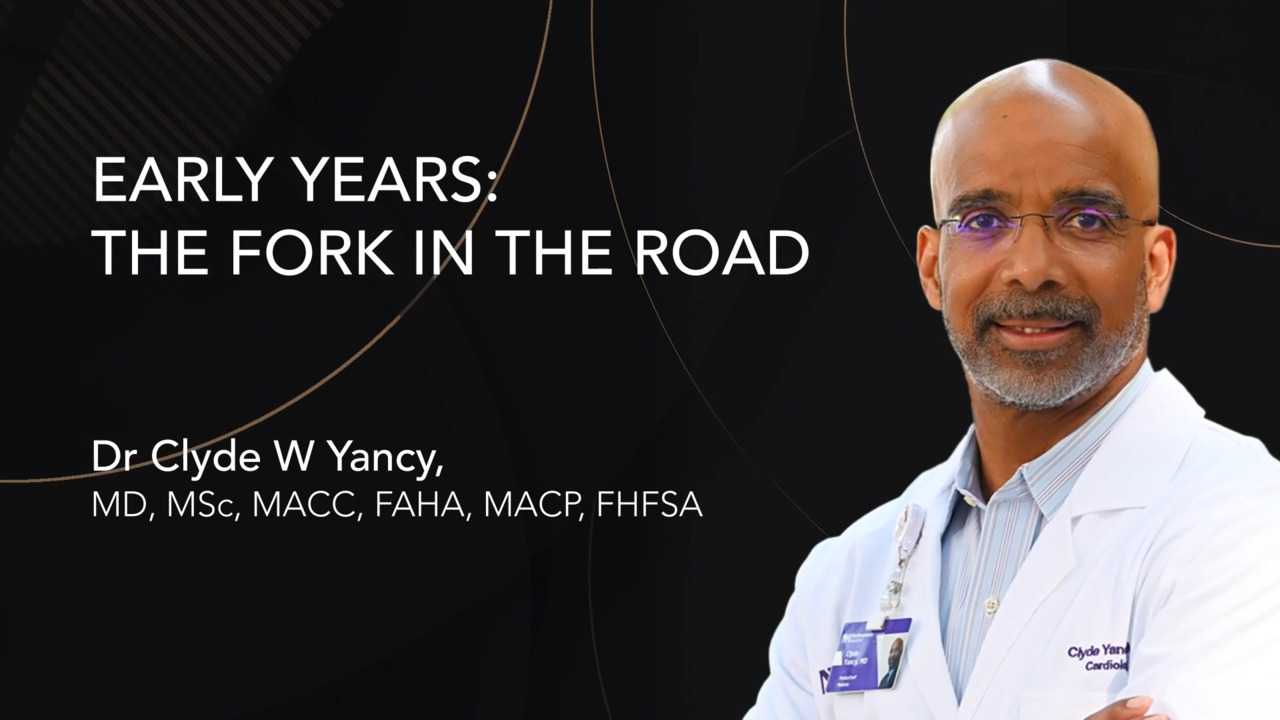 3m 33sPart 2 | Session 2 2. Early Years: The Fork in the Road
3m 33sPart 2 | Session 2 2. Early Years: The Fork in the Road -
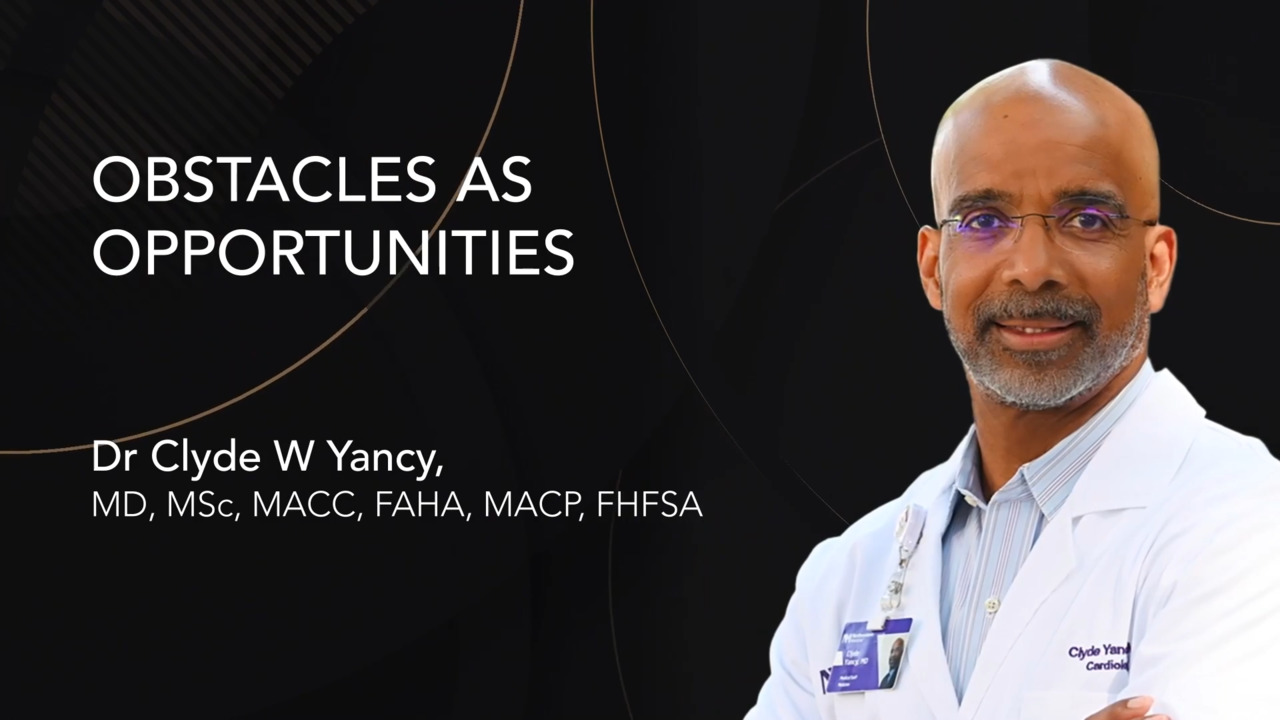 7m 12sPart 2 | Session 3 3. Obstacles as Opportunities
7m 12sPart 2 | Session 3 3. Obstacles as Opportunities -
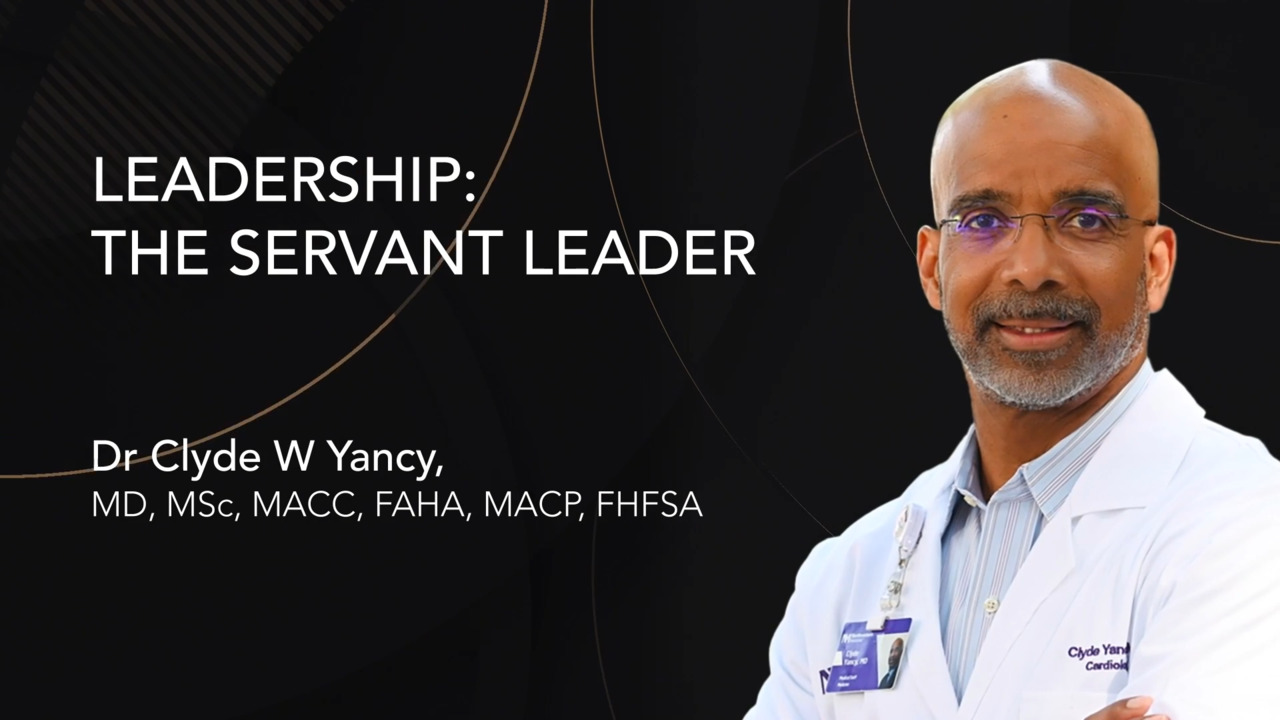 4m 47sPart 2 | Session 4 4. Leadership: The Servant Leader
4m 47sPart 2 | Session 4 4. Leadership: The Servant Leader -
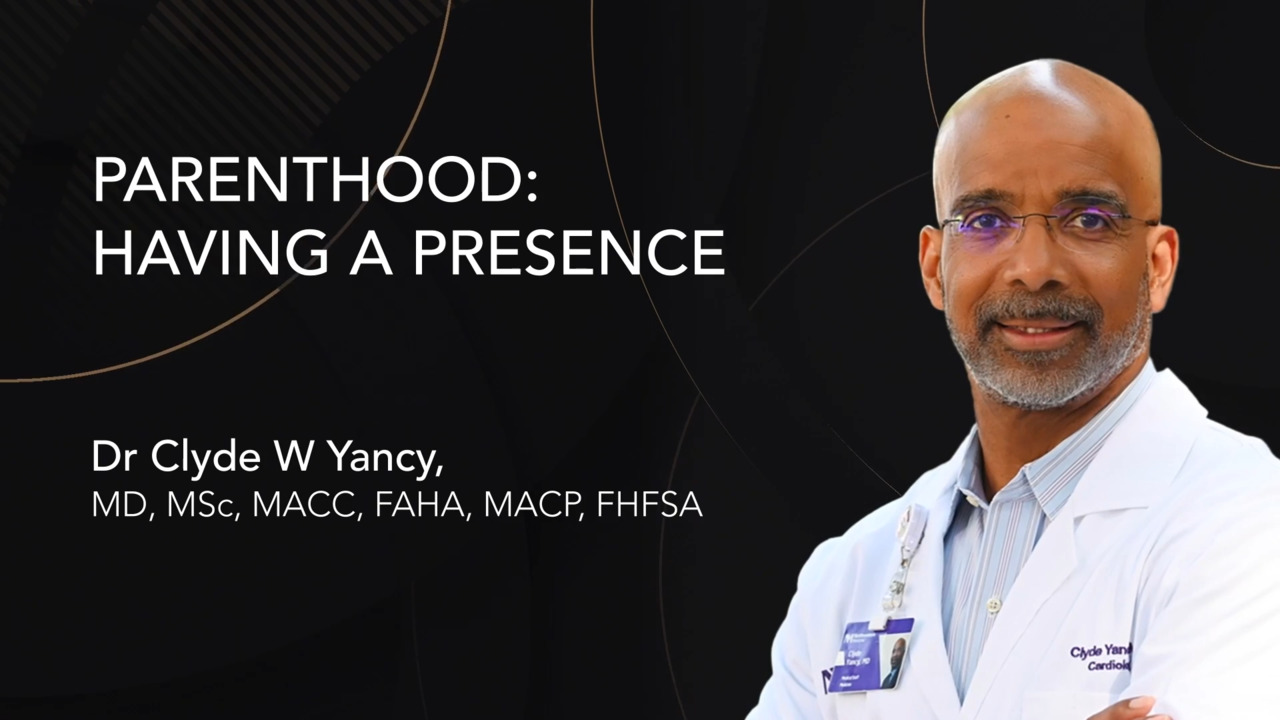 4m 58sPart 2 | Session 5 5. Parenthood: Having a Presence
4m 58sPart 2 | Session 5 5. Parenthood: Having a Presence -
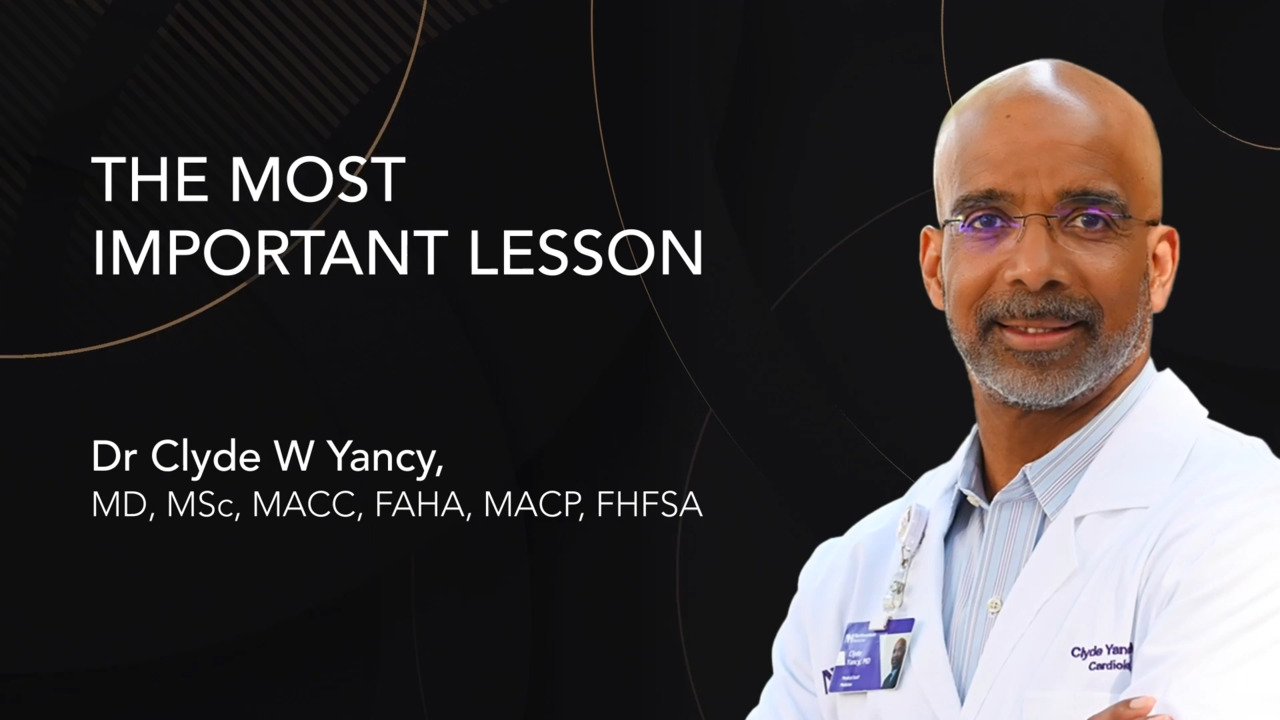 3m 15sPart 2 | Session 6 6. The Most Important Lesson
3m 15sPart 2 | Session 6 6. The Most Important Lesson -
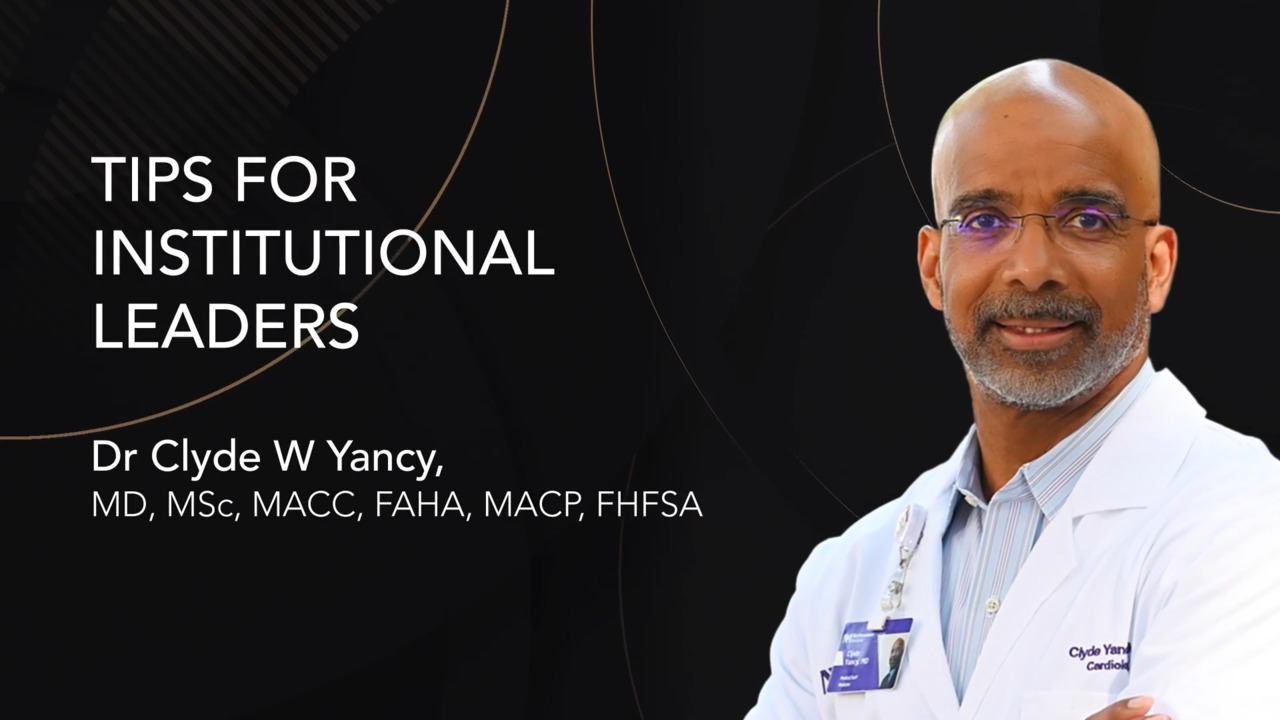 2m 52sPart 2 | Session 7 7. Tips for Institutional Leaders
2m 52sPart 2 | Session 7 7. Tips for Institutional Leaders
Overview
Join Masterclass host, Dr. Harriette Van Spall (McMaster University, CA), in an in-depth interview with Dr. Clyde W. Yancy (Northwestern University, US).
Dr. Yancy, an internationally respected leader and mentor in cardiology, holds positions as the Vice Dean of Diversity and Inclusion, Magerstadt Professor of Medicine, and Chief of the Division of Cardiology at Northwestern University's Feinberg School of Medicine. He is also the Associate Director at the Bluhm Cardiovascular Institute Northwestern Memorial Hospital and a Deputy Editor of JAMA Cardiology.
Discover Dr. Clyde W. Yancy's extraordinary journey as he shares invaluable insights from his professional and personal experiences. Uncover the pivotal moments that shaped his path and learn how he transformed obstacles into opportunities. Gain perspectives on the concept of servant leadership and delve into Dr. Yancy's thoughts on parenthood. In this enlightening interview's culmination, Dr. Yancy imparts his most crucial lesson and offers valuable tips tailored for institutional leaders.
Recorded remotely in 2023.
Editor: Mirjam Boros
Video Specialist: Oliver Miles
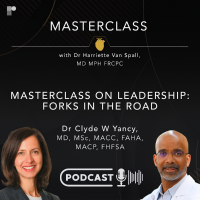
More from this programme
Part 1
Complete Discussion
Part 2
Discussion in 7 Chapters
Faculty Biographies
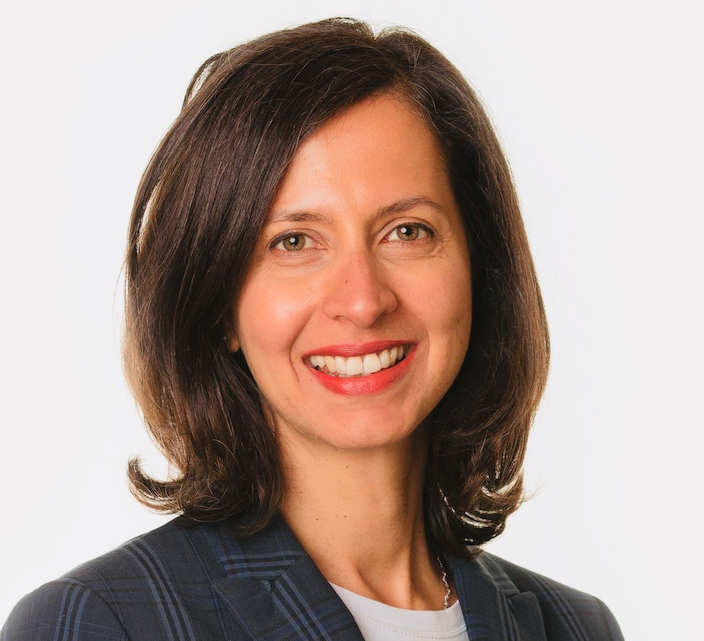
Harriette Van Spall
Associate Professor of Medicine, Director of E-Health and Virtual Care
Dr Harriette Van Spall is an Associate Professor of Medicine and cardiologist and serves as Director of E-Health at McMaster University, Canada. She completed her medical and postgraduate clinical training at the University of Toronto and earned a Master of Public Health degree at Harvard University, US. Dr Van Spall is a Canadian Institutes of Health Research-funded clinical trialist and researcher with a focus on heart failure, health services, and health disparities.
She has garnered more than $4 million in research funding, has won several research awards, and has published her work in high-impact medical journals. She is an invited speaker, media correspondent, and editorial board member active in peer review at several high-impact medications journals and grant funding agencies, including Canadian Institutes of Health Research and Heart and Stroke Foundation of Canada.
Dr Van Spall is an Editorial Board…
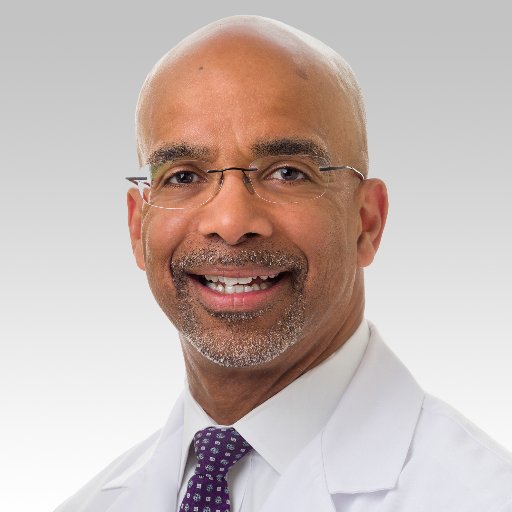
Clyde W Yancy
Chief of Cardiology
Dr Clyde W Yancy, is Vice-Dean of Diversity & Inclusion, Northwestern University, Feinberg School of Medicine in Chicago, US. He concomitantly serves as Chief of Cardiology at Northwestern University, Feinberg School of Medicine, and Associate Director of the Bluhm Cardiovascular Institute at Northwestern Memorial Hospital. He holds the Magerstadt Endowed Professor of Medicine Chair and also holds an appointment as Professor of Medical Social Sciences.
Dr Yancy’s research interests are heart failure, clinical guideline generation, outcomes sciences, personalized medicine, and health care disparities. He is extensively published with well over 600 peer-reviewed publications, an H-index of > 100 and annual recognition as one of the most highly cited scientific authors worldwide. Dr Yancy is Deputy Editor, JAMA Cardiology, and Senior Section Editor (Heart Failure), Journal of the American College of Cardiology (JACC). He serves on the editorial boards for…
Transcript
Dr Van Spall: I'm Harriette Van Spall, and I am so delighted to have Dr. Clyde Yancy with me today. He is the Vice Dean of Diversity and Inclusion and the Magerstadt Professor of Medicine and Chief of the Division of Cardiology at Northwestern University's Feinberg School of Medicine. He is also the associate director at the Bluhm Cardiovascular Institute Northwestern Memorial Hospital and a Deputy Editor of JAMA Cardiology. We are here to discuss Dr. Yancy's remarkable journey as an internationally respected leader and mentor in Cardiology. Welcome, Dr. Yancy.
Dr Yancy: Dr. Van Spall. Thank you. Your introduction is so generous and so kind, and I'm happy to contribute in any way I can today.
Dr Van Spall: I have known you for a few years and I find the balance between your strength, conviction, and also compassion and kindness rather striking. I wonder about how the experiences in your childhood and youth have shaped these traits. Can you tell us a little bit about your family life growing up?
Dr. Yancy: So, first of all, thank you for your kind words. But I will tell you as a takeaway, not just for you but particularly for your audience, that I think the traits you described, if those aptly described who I am and as for others to ascertain, it really captures a thematic approach that I think is relevant, that is, try to capture the timelessness of your profession. There is a timeliness of our profession which is about our content domains for me. For you it's heart failure. For me, there are some other dimensions of healthcare that are timely, for example, health equity. But the timelessness is the actual characteristic, the trait of being a professional. What's that ethos medicine carries with it a certain aura, a certain necessity for us to think in a selfless way, for us to think in an accommodating way, for us to think in an altruistic way. It is about being the good servant. It's interesting that in being a good servant you become a very capable, if not a very good leader.
You articulated correctly that many of these timeless attributes are started by early childhood experiences. Some positive, yes, some not so positive, but they're experiences from which you grow and evolve. Suffice it to say, I'll share three things with you. Obviously, culturally and particularly when I was born in the late 50s, I experienced some very difficult social tensions that either could have inclined me towards anger and confusion and outrage, or towards persistence and resilience and determination to move forward.
Second thing, I'll tell you and I've shared this with audiences before there's no such thing as an overnight success.
There's no such thing as a self-made any person. All of us are products of our commitment and products of the people that have nudged us along the way. So, the first thing I share with you I told you there'd be three. The first thing I share with you is my culturation learning from it, both good and bad. The second thing I will tell you is that along the way, people in my life made an investment in me, saw something, wanted to celebrate it, wanted to elevate it, and in so doing, nudge me along the way.
The third thing I will tell you, though, is the awareness that evolved over time. It doesn't happen right away, but the awareness that evolved over time to really understand what it is about being a physician that matters.
Early Years: The Fork in the Road
Dr Van Spall: Dr Yancy, you had mentioned about cultural experiences that in some ways created a fork in the road, a fork that could either propel one towards overcoming, towards resilience and growth, or to take the road of anger and being embittered. Can you tell us a little bit more about those cultural experiences?
Dr Yancy: Yes. I'll give you the juxtaposition: The community from which I emanated, that is a place where I was acculturated, was a fully segregated, 100% black community. Even today, that same community meets the federal definition of the United States of being impoverished. I came out of nowhere with nothing.
Out of the same experience, I saw the value of education, the importance of having a doctrine, something in which you believe, the possibility of what hard work might allow you to achieve. But I also saw dead bodies on the street. I also saw the wrong end of guns. I also saw despair and was also keenly aware of the evident presence of drugs. So, there was a fork in a road, and I don't mean to be trite, but there was a fork in a road.
And for my community, I chose a path less traversed, and that served me well. I don't mean to be poetic, but there are many references in literature about making decisions in life. Which path will you follow? And that's why I get back to the acculturation. That's why I get back to the nudging. There were those people that nudged me to take the path of higher ascent, the rockier path, the more difficult path, and it paid off well.
But I really want to make this a more contemporary conversation because if we think about the importance of experiences, think about the experiences we've all shared in the last three years. In the last three years, medicine has been uniquely challenged. So much so that a byline that I read just earlier this morning addressed the moral crisis in healthcare because so many physicians and nurses are so disaffected by a, what we all experienced during the pandemic b, how healthcare has changed, particularly in this country, as an economic enterprise.
And the requirements that have been set up on all of us, whether it's electronic record-keeping or surveilling, our efficiencies in practice, counting the minutes that we spend with patients, the minutes we spend with the chart, our click-throughs, all these things are real. There are resources dedicated to how many click-throughs each of us executes when we see a patient. The end result is that so many people are deselecting medicine. We made an oath, we vowed that this was our direction in life, to provide care for the ill, but so many people are deselecting.
Dr Van Spall: Sure, there are some unique challenges in our current era that professionals struggle with, and our culture has changed within medicine itself. And so, we find ourselves in this position and in this era of angst, burnout, dissatisfaction. But there are some universal themes to what we do with frustration and how do we use opportunities to grow both personally and as a profession. I wonder if you would tell us about your leadership journey. You are a strong proponent for equity, diversity, and inclusion, and some of your earlier experiences to me highlight where some of that comes from. What were your early career years like? Tell us about your challenges and how you navigated them because I'm certain that some of those challenges still exist in as much as our era has some unique elements that you may not have experienced.
Dr Yancy: So, I'll give you several specific challenges that, again, either had the opportunity to frame a new path or to incline someone to find a path of least resistance, even after developing the credential of being a physician. For many years, I lived a life of being the only one in the room. Not only because of my self-identified race, but I was several years ahead of myself academically, so I was always the youngest person in the room and the most unique person in the room.
I don't know if you can be a yellow canary twice, but many times I was the equivalent of two yellow canaries in a room. So, it was difficult to communicate because there was very little common experience that I could share with others. And I uniquely was immediately identified as being different. And one has to find a way to work through that. We talk about the phenomenon today of belongingness, but belongingness necessarily means that someone is creating a space, or you are identifying a space where you feel comfortable, or someone is creating a space to enable you to feel comfortable.
My early career was about spaces that were intended to make me feel uncomfortable and make me feel unwelcome. There's no benefit articulating those exact experiences because I recognize that that was during a different time and space. But every experience, Dr. Van Spall, I want to make this very clear.
Every experience frames you and that frame is a dynamic process. It's a malleable iterative process, and it all depends on what's your constitution. I particularly like this concept of grit in Angela Duckworth's book because there are a lot of smart people, a lot of smart people, but it's the people that are both smart and resilient, both insightful and persevering, both bright and committed.
When you've got that assortment of the several skills I just articulated, and you can learn from every experience, good or bad, then you go through.
But in my early career. The number of times I was told no was remarkable. Let me give you just one vignette. I went to a historically black college and university that should have been the ultimate space of belongingness.
And I walked into the pre-med advisor's office with a stellar academic record and said, I want to become a doctor and I want to go to Tulane University School of Medicine. She said forget about it. There's no way. Someone who should have been supporting my career deflated my balloon the minute I walked in the room. But I worked through that. I didn't accept it. I still remember her name, by the way, but I worked through that, and I said, I'm going to persist.
I remember in the same vein, going to an undergraduate pre-medical enrichment program in Nashville, Tennessee, on the campus of Meharry Medical College. It was a great program. I was doing wonderfully well, sat down with an advisor, we talked about my aspirations, that I want to go to Tulane and say, what happened? What is this? What is this? But again, I didn't listen. And so, the end result is that I had early admission to Tulane when I was 19 years old and started med school at 20 because I had just persevered.
I was either too foolish to listen or too committed to care what they said to say. But those kinds of experiences could have been the roadblock. Those kinds of experiences could have inclined me to do something completely outside of medicine, but it was just something unique, something about my DNA, I suppose, that made me keep working through it all. But you learn from those experiences.
And so even today, Dr. Van Spall, even today, people set up impediments. People are not accommodating; people are not welcoming. I hear no. I, hear no even today. And I just process that statement, process that experience, think about my journey, and I persevere. I persevere.
Dr Van Spall: And without knowing some of these personal experiences of yours, I knew about these experiences of yours because it shaped who you are. And you manifest these experiences through the hope you provide others and through the way you advocate for others, including me.
So, thank you for sharing some of those more personal experiences because they illustrate how roadblocks could be opportunities to climb and to grow and to excel.
Dr Yancy: Well, Dr. Van Spall, it becomes binary. It becomes binary. You can either become angry or you can become determined. It's binary. Which path do you take? And again, if we're talking about takeaways for those that are listening, choices are another really important takeaway.
What did you choose and when did you choose it? And what were the consequences of that choice? You can be angry or you can become determined.
Dr Van Spall: Sure. Sometimes I like to think of obstacles as, sure, put that wall in front of me and I'll show you how I could climb. Obstacles as opportunities.
Dr Yancy: Yeah, obstacles as opportunities. That's the way you should think about it.
Dr Van Spall: Right, and you probably used that throughout your career. And I wonder if you could share some of your experiences in navigating yourself to a position of leadership. For example, at the American Heart Association. How did you find yourself in such a prominent place?
Or, I shouldn't say how did you find yourself, but how did you navigate yourself to become the kind of leader you are, the leader of a national organization and then an internationally recognized leader?
Can you think of two or three key instances in which you had to make choices or decisions, or perhaps they were strokes of luck that got you to these positions?
Dr Yancy: So, I'm always thoughtful about conversations that implicate luck because I think luck is just simply the intersection of being prepared and opportunity. Opportunities always come your way and if you are sufficiently prepared, some call it luck, I think differently.
But one way to respond to this conversation is really to think agnostically, not in the sense of American Heart Association or Northwestern American College of Cardiology or various international alliances, but think about what's that skill set, how do you navigate a space? If you are interested in leading, how do you do that? And I always like to compartmentalise things and countable statements, two or three statements.
So, I think one of the most important things about leadership is that this concept of investment. Are you invested in the American Heart Association? Are you invested in the Royal College of Physicians? Are you invested American College of Physicians?
When you have an investment in something, that's the first important attribute, you can't lead something that you don't want to own.
I personally own the American Heart Association. I own the American College of Physicians. I own the American College of Cardiology. Not me individually, but it's part of my, if you will, professional DNA. So first is that investment experience.
The second, and this is something that's very difficult for people who are thinking about becoming a leader. Second is your willingness to listen. So many people believe that being a leader infers that you want to pontificate, you want to stand up, you want to be out front, you want to have presence. That's not correct. Your willingness to listen, to understand what's going on in that ecosystem, what are the issues, what are the challenges? Give that deliberate thought.
The third thing which is probably the most important then is do you have what it takes to be a servant leader? So, if you adopt an investment approach, that this is a priority to me personally, if you think about the importance of listening, the best leaders, the best leaders listen much more than they speak, they think much more than they act. And then if you can become a servant leader because of your selflessness, whether it's the American Heart Association or any other entity, the leadership opportunity will come.
Now, I'm from Louisiana, Harriette. I think you know that. And in Louisiana, we have this saying about giving people a little something extra. And the little something extra here is, can you be patient?
Boy, that is such a contrary theme for North American mindset because we have a pace, we have an impatience. We have a desire to make things happen right away. But if you can take those three things and add this little something extra of patience, it's amazing what will happen. Are you invested? Do you listen more than you speak? Think more than you do? Do you take a servant leader approach and are you patient? If you can put those three plus one together, that's the (...) phenomena. Guess what? Then you get lucky.
Dr Van Spall: Sure. I would love to hear your experiences as a parent how you managed being a present parent, especially in the face of loss and continuing to grow in your profession. What are some of the sacrifices that you had to endure and how did you manage being a present parent and cardiologist in your environment?
Dr Yancy: It's very interesting, Dr. Van Spall. We can't be multiple personalities. We have to be who we are and be consistent with that. And one of the important lessons learned as I began to study the curriculum of leadership and anyone that has an interest in leadership, I would advise doing such, is that I got to understand my own personal DNA personally as in how my personality is constructed, what things I value. And it's so interesting to know that what I value professionally, I also value personally.
What I portray professionally, I also portray personally. There are words like integrity and character. I'm going to be careful using such words. But there is a necessity for a parent to have both presence as someone that sets a bar, but also to be present if someone is physically there to engage. And as a leader in cardiovascular medicine or American medicine, I have to have a presence. I have to represent something. I have to represent some truth, some attribute. But I also have to be present and engage with others.
So, I think if I take the presence that's necessary and the present that's necessary, we can do things.
Dr Van Spall: Yeah. I find that leadership and parenting overlap in the sense that there has to be an internal consistency about the way we live our life, the way we model behaviour and how we lead by example.
You had the unique challenge of parenting your girls through loss. And I wonder if there were lessons that you learned through your loss that you could share with us. You had talked about how times have changed, how our practice has changed, but there are some universal themes in your life, both personal and career, that all of us stand to gain from. So, share some of those lessons with us.
Dr Yancy: Let me share just one lesson, because I think it's the most important lesson, particularly for persons that are just embarking on your career. For everything else we've talked about today, Dr. Van Spall, for everything else, about resilience, about being a servant leader, about listening, et cetera, all of that stuff.
The one thing I want the early career person especially to appreciate is this; have a life. None of these matters if you don't have a life. Be a part of that life. Embrace that life. Have a life is very personal. For me, it was my wife, the mother, my children, was incredibly important. It really defined who I was as a person, but my experience was cut short by breast cancer.
I would do anything to get back into that moment and have one more opportunity for that life. So, when you have that life, never take it for granted. I have the privilege now of being remarried and so I'm engaged in life yet again and it's a wonderful experience, but I want everyone as an early career, never take your personal life for granted. T
hose opportunities are precious, they're valuable. Invest in those opportunities. I promise you; the quality of your professional work will directly parallel the quality of your personal life. Your personal life is soaring. Your professional work will soar. There is no necessity for there to be a conflict, challenges on both sides of that equation, clearly, but if you can navigate both sides, it will work well. The navigation for me was hard.
A single parent for 20 years, doing a lot of things on my own. I don't wish that on anybody. But you know as a parent, you find some resiliency, you find a gear you didn't know you had, and you do whatever is necessary.
I'll repeat that: you do whatever is necessary to make that equation work. So, for the people that are early in their personal and professional adult life, everything else we've said today is second to this one statement: have a life. And that includes pastimes, that includes what I call checkoff (...). That includes doing things that allow you to get your hand out of this game and get it into something else. That gives you a sense of exhale or pause. But please, have a life.
Dr Van Spall: Both you and I are passionate about growing people, about creating workspaces that are safe, inclusive, fair, and just. I'd like to end this conversation by asking you for two or three tips that you could share with other institutional leaders, some of whom have only known hierarchical leadership styles, and some of whom are progressive but may need some direction in terms of how to pivot their organizations towards fairness, equity, justice. What are some tips you can leave us with?
Dr Yancy: Make every effort to accommodate diversity of thought, diversity of inputs, diverse ideation. I'm using a very different phraseology. I'm not talking about diversity per se, but I'm talking about the quality that contributes to the excellence that I said is point 1. That comes from diversity, and its diversity of thought. And number three, I've said it before, but I'll rearticulate it and endorse it yet again: Listen. So, if you are committed to excellence, if you can accommodate different ideas, diverse ideation, and if you're willing to pause and listen, those, I think, are the ingredients for success as we go forward.
There are lots of other technical, tactical things that we as leaders do, but in terms of getting back to an earlier word, the timeless attributes that will allow leaders to soar, I think those are the attributes that will allow leaders to soar well.
Dr Van Spall: Clyde Yancy, let me thank you for spending this time with us and for sharing some personal experiences and professional tips that all of us will gain from. I appreciate your time, and I look forward to seeing you again.
Dr Yancy: And the next time I see you, we'll reverse this process. I'll be the interviewer and you'll provide the answers. How about that?
Dr Van Spall: Perhaps we'll have to wait for a good ten years before I'm in that position.
Dr Yancy: Perhaps, but we'll do it someday.
Dr Van Spall: Clyde, it was so nice to see you. Thanks for the invitation. I appreciate it. Have a wonderful day now.






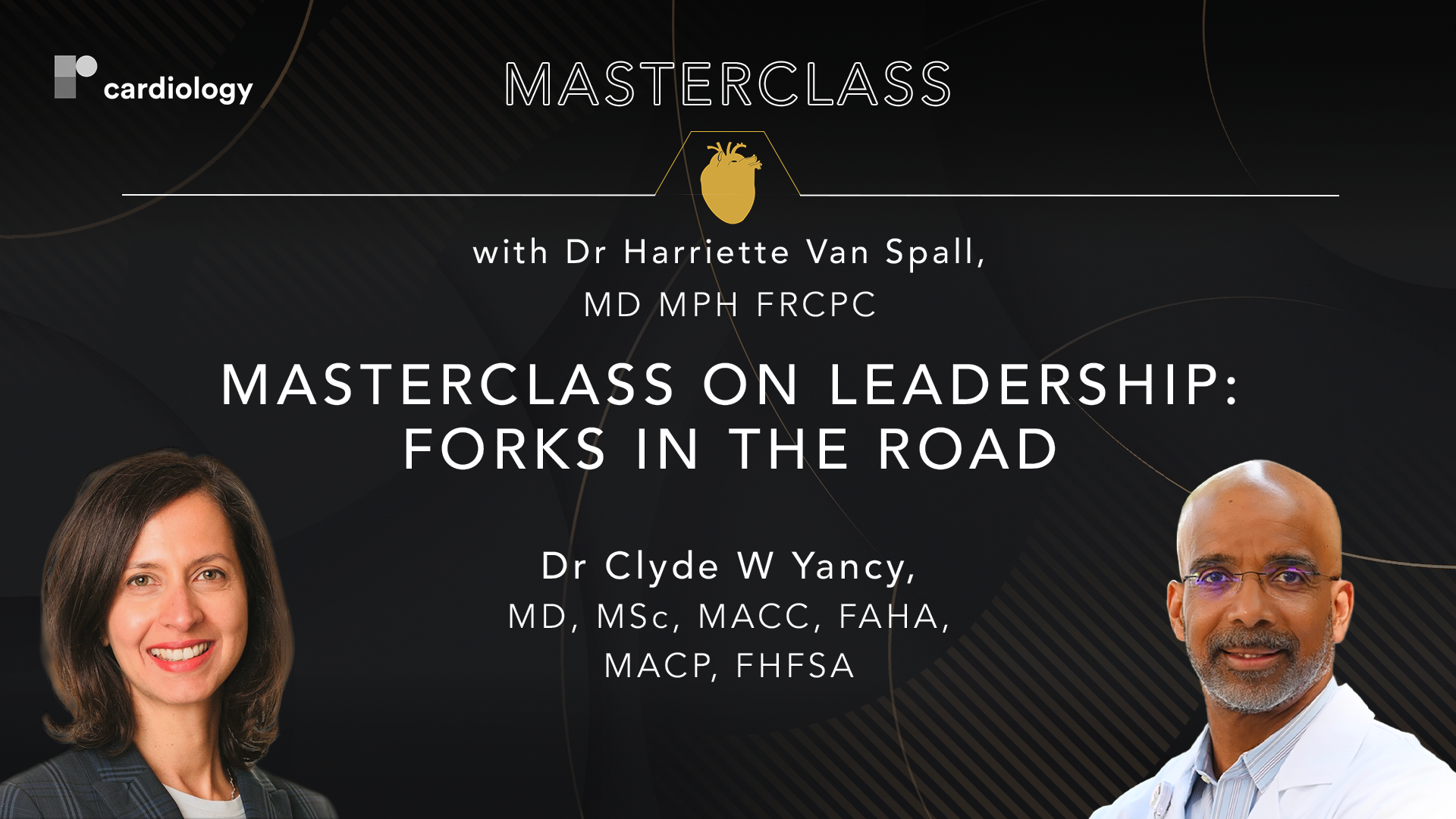
Comments